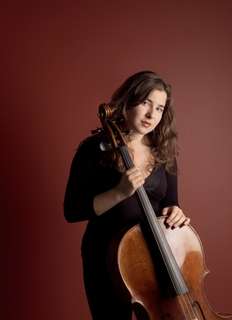|
Back
Classical New York
Isaac Stern Auditorium, Carnegie Hall
03/20/2010 -
Peter Ilyich Tchaikovsky: Variations on a Rococo Theme
Igor Stravinsky: Apollon Musagète (Apollo, Leader of the Muses)
Ludwig van Beethoven: Rondino – Selections from The Creatures of Pometheus
Alisa Weilerstein (Cello)
Orpheus Chamber Orchestra

A. Weilerstein (© Gerardo Antonio Sanchez Torres)
Not one of the three composers represented by the Orpheus Chamber Orchestra last night could be considered a “classical”–i.e. 18th Century–composer. Yet every single work had a classical, balanced undertow, they were all homages to composers before them.
And in that way, the Orpheus claim that this was in honor of the Spring equinox might be justified. Yes, the grammar of Stravinsky, Tchaikovsky and Beethoven had diverse rules, but the substance was the same. More important, the Orpheus has the genius to give it that patina of equilibrium and clarity, and thus to offer a most cohesive program.
The Stravinsky “classical” ballet, Apollon Musagète (later renamed Apollo), in fact, has such disinterested emotion that my first few hearings produced a kind of boredom. Later, I realized that this “disinterest” could be heard as a sort of mysticism. On the one hand, a tranquility (even the jauntier dances of the Muses are honed down). In the main, though, one can imagine a Zen koan, a reply to a question which transports one up from logic.
How to offer this unlikely music from the Dionysiac Sacre? With the pure silk-spinning sounds of the Orpheus. Little hesitation, no retardation, and rhythms that transmogrify into each other rather than “balletic” steps. In the center, the long violin solo by Eric Wyrick generated a line beautiful in itself, yet somehow detached, even the angular lines neither jarring nor out of place.
The following Tchaikovsky Rococo Variations was a conscious homage to Mozart, but–even more than Stravinsky–purely Russian. The wondrous Alisa Weilerstein, in a blazing red gown against the somber black of the orchestra, with no conductor to hog the honors, whipped into that opening theme as if she wanted to break loose. Ms. Weilerstein actually did break loose in that very long cadenza which explores every facet of the cello.
That, in, fact, probably wasn’t Tchaikovsky at all, but one Wilhelm Fitzenhagen, who virtually rewrote, on the original manuscript, his own “cello-ing” of the music. Recently, cellists have learned the original Tchaikovsky, but Ms. Weilerstein prefers the Fitzenhagen version. Possibly because it gives her a chance to exhibit her awesome technical powers and the great passion she shows for the music. (Just to show that it wasn’t all Slavic passion, she gave a simple encore of Bach’s Bourrée from the Third Suite.)
The first Beethoven piece, a Rondino for wind octet gave justification for Stravinsky’s famous quote that the “early” Beethoven was far superior to the later works. It was new to me, but immediately the solos by two horns made it far different than the composer’s forebears. In fact, I had never heard two horns so involved in echo effects, accompanied by round-toned oboes and smooth clarinets. I heard some possible fluffs among the horn soloists, but these could have been (I think charitably) merely grace notes.
The Orpheus also added a double bass to the wind ensemble, sometimes doubling bassoons, sometimes horns. The winds were certainly satisfactory on their own, but Orpheus probably has their arcane rationale.
Finally an early Beethoven which needed no excuses. Personally, I would love to hear the complete Prometheus, with its graceful dances and instrumental solos. Actually, the Orpheus made a recording of this about 20 years ago, and playing it now I realized what a pleasant divertimento this is.
Like the opening Stravinsky Apollon Musagète, this is a most unlikely ballet, but the music is graceful, colorful and, yes, very classical.
Harry Rolnick
|